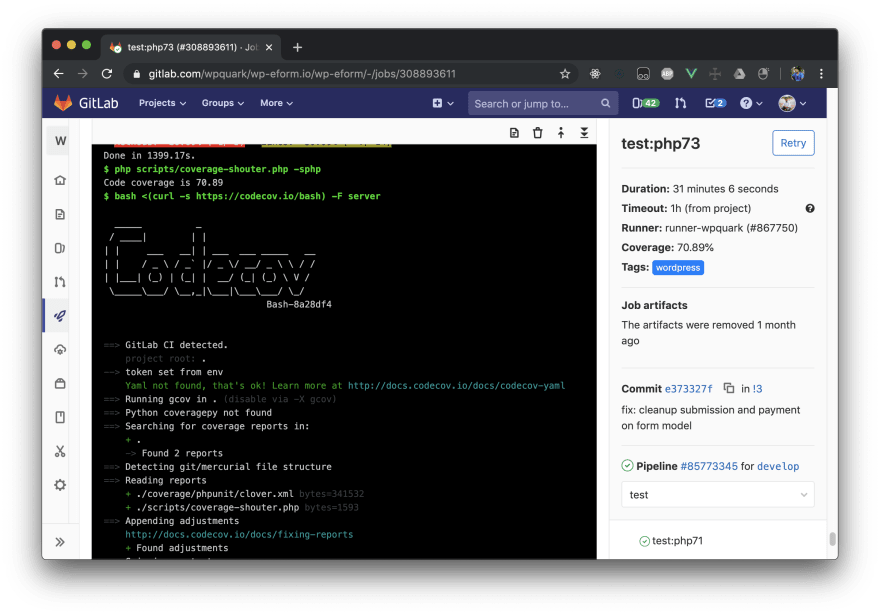Gcov For Mac
I was inspired while watching a talk by Kevin Ottens about refactoring OpenGL code in Qt to take a look at gcov & lcov. Gcov is used to analyze code coverage – which lines of code have actually been executed while running an application. Lcov is a tool that can produce HTML reports from the gcov output.
Check to see if your gccis reallygccwith gcc -version. On newer Macs, gccis now linked to llvm-gcc, which evidently doesn't support gcov. If you find that this is the case, use clang/clangin lieu of gcc/g. The GCOV development files are related to GNU GCC. GCOV file is a GNU GCOV Logfile. GCOV is a test coverage program. Use it in concert with GNU CC to analyze your programs to help create more efficient, faster running code. You can use gcov as a profiling tool to help discover where your optimization efforts will best affect your code.
Its part of the GCC package from gnu. It's a nice Fortran compiler and the best part is it is free. If you've searched the web you know most Fortran compilers are pricey. The link above will let you access precompiled binaries for gfortran. The binaries are packaged as simple to install Mac.dmg files. Code coverage tool gcov free download. OpenCover OpenCover is a free and open source code coverage tool for.NET 2 and above (Windows OSs only - no M.
What is CppUTest.
CppUTest is a C /C++ based unit xUnit test framework for unit testing and for test-driving your code. It is written in C++ but is used in C and C++ projects and frequently used in embedded systems but it works for any C/C++ project.
CppUTest’s core design principles are:
- Simple in design and simple in use.
- Portable to old and new platforms.
- Build with Test-driven Development for Test-driven Developers.
Setting up CppUTest
There are several ways to setup CppUTest. One is to install via package management and the other is from source. The big difference is that from source you can use MakefileWorker.mk. MakefileWorker is not supported pre-packaged. MakefileWorker does not require you to know a lot about make and makefiles to get started.
An easy way to get your first test case running is to use James Grenning’s cpputest-starter-project for gcc or cpputest-starter-project for Visual Studio. James is the author of Test-Driven Development for Embedded C. You’ll find instructions, your first test case, and some other example code. James’ training resources use MakefileWorker, so you need to install from source.
Adding tests to untested C and C++ can be a big challenge. You might find Get your Legacy C into a Test Harness a useful recipe and resource. The page includes links to numerous articles of real legacy C challenges.
Pre-packaged install
Linux
There is a Debian and an Ubuntu package available for CppUTest. This is by far the easiest way to install it, via:
MacOSX

For Mac, a Homebrew package is available too. You can install via:
From source install
You can download the latest ‘automatically released’ version:
- Latest version passing the buildThis version is automatically packages after a build has passed.
Alternatively, you can clone the github repository, read-only:
Or clone it via ssh (which requires a github account)
CppUTest can also be added to your git repo as a git submodule.
Now that you have CppUTest sources, you can build it with your favorite build tool (CMake or autoconf).
Building with autoconf requires you to (this requires you to have installed GNU autotools, apt-get/brew install automake autoconf libtool):
You can use make install if you want to install CppUTest system-wide
NOTE: Building from cpputest_build means you will not be able to use MakefileWorker.mk. To use MakefileWorker you need to build from the cpputest home directory.
Using CppUTest with MakefileWorker.mk and gcc
If you want to use CppUTest’s MakefileWorker, you cannot currently get CppUTest using the “Pre-packaged” options described above. Instead you can get CppUTest from source using the options already described.
Change to the top level directory of CppUTest (the directory containing include/ and src/ among other files)
You will want to add **export CPPUTEST_HOME=
Using CppUTest with Visual Studio
You can build CppUTest using cmake or in the Visual Studio IDE.

from Visual Studio IDE
Gov For Michigan Vote Primary
Depending on your VS version double click either
- CppUTest_VS201x.sln - for VS 2010 and later
- CppUTest.sln - for pre VS 2010
Say yes to suggested conversions. Select the menu item corresponding to run without debugging. CppUTest should build (probably with warnings). When the build completes the test runner runs. You should see over 1000 tests passing and no test failures. The build also produced a static library (cpputest/lib) holding CppUTest you can link your tests to.
To use CppUTest, define an environment variable CPPUTEST_HOME that points to the home directory of CppUTest. You will find a working example and some more help in cpputest-starter-project for Visual Studio.
How to create a coverage report
You can use autoconf to create a coverage report for CppUTests own tests. If you have lcov installed, a browsable html report will be generated as well. After the steps outlined in the previous paragraph, do the following:
This will generate a file called gcov_report.txt with the coverage report in plain text format. It will also generate an HTML file called gcov_report.txt.html. If you have lcov installed, you will be able to browse the lcov report by opening ./cpputest_build/test_coverage/index.html . The lcov report is by far the easiest way to inspect CppUTest’s own test coverage.

Alternatively, you can use CMake if that is the build tool you fancy (this requires you have install CMake, apt-get install cmake):
For Windows users, the above will work with cygwin. There are also several MS VC++ projects available.
Where to find more information
- If you have any questions, check out the Google Groups
- The source is at the main github page
- You can report bugs or features at the issues page
- You can follow CppUTest on twitter
Install Lcov Mac
Quick introduction (some code!)
To write your first test, all you need is a new cpp file with a TEST_GROUP and a TEST, like:
This test will fail.
You can add new tests to the test group by just writing more tests in the file, like this:
Gcov For Macbook Pro
You do need to create a main where you run all the unit tests. Such a main will look like this:
For more information, We’d recommend reading the manual or, even better, check some existing tests such as SimpleStringTest or (a bit more complicated) MemoryLeakDetectorTest or the mocking tests or just check out the Cheat Sheet
Related projects
Gcov Macros
For Eclipse users, also check:
Gcov Format
- CppUTest Eclipse Test Runner This will allow you to run your tests JUnit style with red and green bars, and rerun arbitrary selections of tests.Prerequisites:
- CppUTest off master
- Eclipse Juno, Kepler, or later
- Eclipse C/C++ Unit Plugin (if not already present in your version of Eclipse; install directly from Eclipse Help -> Install New Software…).
Authors and Contributors
Gcov For C++
CppUTest has had many contributions from its users. We can’t remember all, but we appreciate it a lot! Much of the original code was written by Michael Feathers (based on CppUnit Lite). The current main maintainers are @jwgrenning and @basvodde
